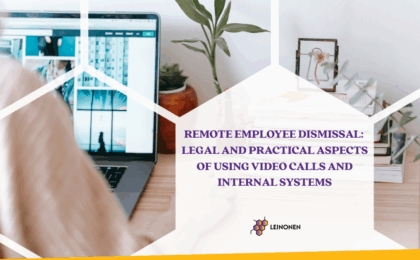Procedure of Termination of an Employment Contract
Actions | Description | |
1. | Evaluate employee’s occupational competences and their compatibility with the competences necessary to perform the contracted work | – Employer should define clear work responsibilities and achievable goals for the Employee The criteria, which an employee should meet in order to correspond to the occupational competences necessary to perform the contracted work should be known to the employee in advance. Only when the employee is informed of what is expected from him/her the employer can objectively determine that the employee lacks the adequate occupational competences necessary to perform the contracted work. Therefore, upon hiring an employee it is recommended to define clear work responsibilities and achievable goals, if appropriate for the work position. – Evaluation of the employee’s occupational competences Employer must carry out an evaluation of the employee’s work performance in order to ascertain whether the occupational competences of the employee corresponds to the occupational competences necessary to perform the contracted work. The evaluation should be documented. In order to avoid disputes related to discrimination the evaluation process and the criteria that is evaluated should be objective, neutral and equal among employees. If in the evaluation process the employer determines that the employee lacks adequate occupational competences, the employer may proceed with the termination of employment relations. |
2. | Offer the employee to work in a similar work position at the employer’s company or related company of the employer | It is mandatory for the employer to evaluate whether there are any open vacancies that are similar to the work position of the particular employee, and that would correspond to qualification/ occupational competences of the employee. Such open vacancies must be evaluated within the employer’s company as well as in its related companies. If there is such open vacancy, employer must offer the employee the possibility to be employed at this vacancy. The offer should be made in writing. If the employee refuses to be employed at the offered vacancy or if the employer determines that there are no such vacancies, then the employer may continue the termination of employment relations. The fact that the employee has refused from the vacancy or that there are no such vacancies should be included in the Notice of Termination. |
3. | Determine whether and for how long the employee has been a member of a trade union | It is mandatory for the employer must ascertain whether the employee has been a member of a trade union for more than 6 months. The request to provide information and the employee’s answer should be made in writing. If the employee has been a member of a trade union for more than 6 months, the employer must acquire a consent from the trade union. |
4. | Obtaining consent from the trade union (if necessary) | The employer must submit a request to the respective trade union asking the trade union to provide consent to the Notice of Termination. If trade union fails to inform the employer of its decision within 7 working days, it is considered that trade union has agreed on the termination of the employment contract. If the trade union does not agree with the termination of the employment contract, the employer, within one month after receipt of the reply of the trade union, is entitled to file a claim to a court on termination of the employment contract. |
5. | Consider conditions, under which it is prohibited to provide the Notice of Termination | It is prohibited to terminate employment relation on the grounds of Section 101(1), Point 6: – to a pregnant woman, as well as to a woman during the period following childbirth up to 1 year, but if a woman is breastfeeding then during the whole period of breastfeeding, but no longer than until 2 years of age of the child; – during the period of temporary incapacity of the employee and the period when the employee is on a vacation or is not performing work due to other justifiable reasons. |
6. | Notifying the Notice of Termination
| The employer shall prepare a written Notice of Termination and notify the employee thereof. It is mandatory to indicate in the notice the circumstances, based on which the employment contract is terminated. When terminating the employment contract pursuant to Section 101(1), Point 6 of the Labour Law, the term of the Notice of Termination is one month. The employer can notify the Notice of Termination as follows: – In person (it is recommended to ask the employee to sign on the Notice of Termination confirming the fact that he/she has received it); – If the employee refuses to receive the Notice of Termination in person, the employer is entitled to read out the notice loudly to the employee in the presence of two witnesses, registering the fact of reading the notice in an act; – Via post to the address provided in the employment contract; in this case, it is considered that notice of termination has been received on the seventh day after the document has been given to the post; – Via e-mail, using a secure e-signature, only if it is expressly provided in the employment contract or collective agreement that such means of communication is acceptable to the parties; in this case, it is considered that notice of termination has been received on the second day after it has been sent. |
7. | Disbursement of sums due to the employee, including the severance payment | The employee is entitled to receive severance payment, the amount of which is determine in accordance with the Section 112 of the Labour Law or respective employment agreement, or collective agreement (if applicable). The severance payment and other sums (salary, compensation for unused vacation, unpaid advance payments and other settlements, if applicable) due to the employee must be paid on the last working day of the employee. |
Other Significant Aspects
1) Ascertain whether the particular employment agreement or the applicable collective agreement does not foresee special provisions regarding termination of the employment contract.
2) The actions necessary to terminate the employment contract have to be documented in order to serve as a proof in case any disputes with the employee accrue.
3) The employee is entitled to file a claim to the court on recognising the notice of termination invalid within 1 month after the receipt of the notice. If the employer’s notice of termination has no legal basis or the procedures prescribed for termination of employment contracts have been violated, such notice in accordance with a court judgement shall be declared invalid and, upon request of the employee, the court can reinstate the employee in the work.
4) In the event of disputes, the employer is obliged to prove that the notice of termination has legal grounds and that the procedure of issuing the notice complies with the laws. If the employee has filed a claim on reinstatement, the employer is obliged to prove that by making an employee redundant the employer has not violated the employee’s rights to continue employment legal relationship.
If you need assistance with termination of employment relation or you have any questions regarding other Labour law issues, we invite you to contact the lawyers of Leinonen Latvia.
This information has been prepared by Leinonen Latvia, Tax & Legal Advisory Department.



